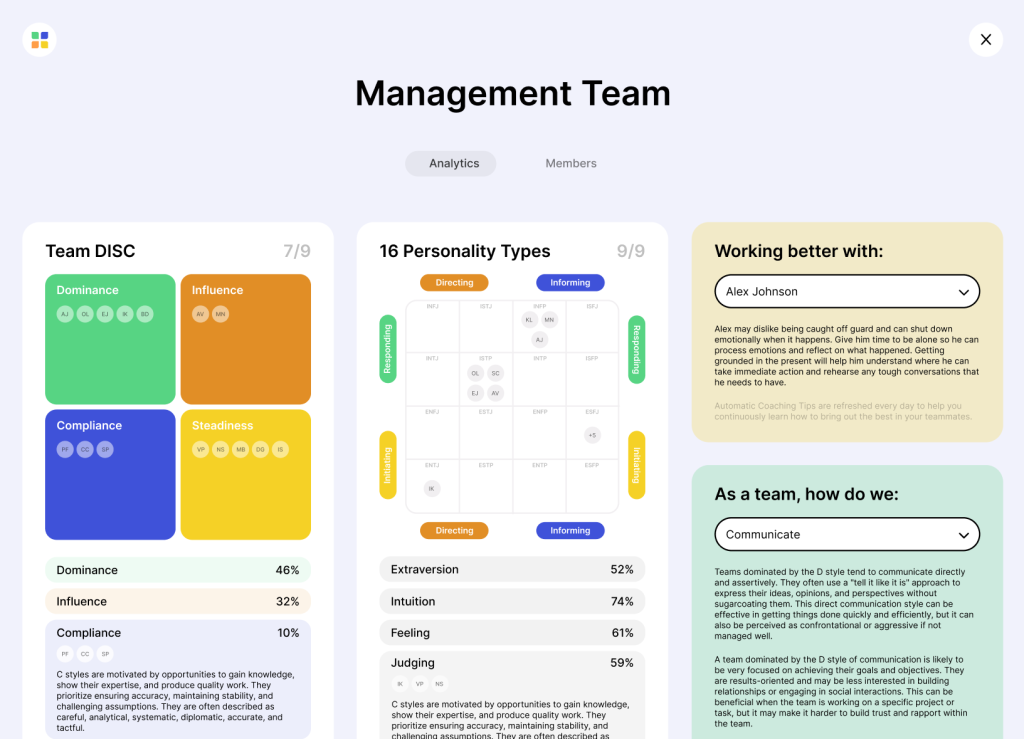The INTJ personality type, as defined by the Myers-Briggs assessment (MBTI test), gets its definition by the four cognitive functions that characterize it: introverted, intuitive, thinking, and judging.
These individuals are tactical and creative strategists with outstanding problem-solving abilities. Due to their intelligence and rationality, INTJs are nicknamed Architects, Strategists, or Masterminds.
INTJs are usually high achievers who never get tired of analyzing and exploring. However, in addition to their four traits that clearly distinguish them from the rest of the personality types, there’s another segment that crystalizes their character – the identity trait.
The identity trait divides INTJs into two subtypes, Assertive and Turbulent. The difference between INTJ-A and INTJ-T is mainly seen as how they express their ambitions, deal with unexpected changes, and interact with other people.
Differences Between INTJ-A and INTJ-T
Friendships
People are sociable human beings, so regardless of the enhanced introverted function that both Assertive and Turbulent INTJs share, they do need social interaction and people to confide in. We have to note that neither type is particularly interested in making friends, yet, the way they open up to people is different.
Namely, Turbulent INTJs are more likely to express how they feel and support others within their own understanding. They are also more likely to accept and share ideas with other people thanks to their more approachable attitude.
On the other hand, Assertive INTJs are more restrained and less approachable. They rarely get involved in open communications and hardly ever ask for opinions and considerations. This is mostly due to their higher self-confidence and extreme introversion. They are more independent and have a minimal circle of close friends.
Relationships
Generally speaking, INTJ in relationships are as analytically and strategically oriented as everything else in their lives. They aren’t particularly affectionate and usually show love through support and spending time on mutual activities with their partner.
INTJs are known to set very high goals and expectations, and the same refers to finding their perfect mate. However, that ‘ideal’ can cause dissatisfaction as rarely are human beings as perfect as INTJs imagination creates them to be.
When comparing Assertive INTJs to their Turbulent counterpart, they seem to be more indifferent, more distant, but at the same time more reassuring and confident in what they want.
Turbulent INTJs are more likely to express their feelings and comprehend their partner’s feelings. Still, they appear less confident in their decision, so they might ask for support and open confirmation of their partner’s feelings.
However, both subtypes are likely to shut down in case their partners continuously show powerful emotions.
Workplace
The dedication and enthusiasm INTJs approach for their projects and goals makes them almost perfect employees or business owners.
They have progressive and future-oriented ideas, with a dose of originality and progress. In their working environment, INTJs prefer working independently, but their motivation is different.
Assertive Architects are more self-confident, and even in moments of uncertainty, they are willing to take risks without asking or consulting other people.
On the other hand, Turbulent Architects are more stress-prone and often question their decisions. This makes them act proactively and work on possible problems long before they emerge.
Turbulent INTJs are more likely to find solutions for underlying problems since they are more sensitive to criticism and analyze things from various perspectives.
They also tend to worry more and become anxious when they are unable to meet their expectations.
Working in a Team
Teamwork is not something that INTJs’ personalities are interested in due to their introverted and independent trait. Plus, Architects are not very social and rarely discuss work-related projects with other colleagues.
However, if they have to work in a team, they are reliable and dedicated to achieving the goals and meeting the targets. If the team members are efficient, proactive, and mind their own business, INTJs are likely to thrive.
When comparing Turbulent INTJs to Assertive INTJs, the Turbulent ones are more likely to have communication flow with the rest of the team and more cooperation. They are also more likely to appear tense and ambitious, but at the same time more willing to share ideas and opinions with the team.
On the other hand, thanks to the independent attitude, Assertive INTJs are less likely to follow guided instructions and requests. They are unwilling to adhere to authorities’ demands, making teamwork and collaboration difficult.
INTJ-A Strengths and Weaknesses
Less Stressed and Anxious
Even when dealing with the unexpected, INTJ-A maintains their inner peace and tends to look for alternative ways to tackle the issues. Many people confuse this indifference with not caring about essential matters, but it is far from being such. Assertive INTJs are simply better at defocusing and thinking outside the box.
High self-esteem
Assertive INTJs are incredibly independent and rely mostly on their capabilities. They hardly ever question their decisions and approach problems very analytically and rationally.
Independent
Assertive Architects boast independence in everything they do, from their work assignments to their personal lives. While it definitely has its flaws, the autonomy they boast of gives them a feeling of superiority and control, which is confidence-inspiring.
INTJ-A Weaknesses They Should Work On
Dismissive of emotions
Assertive INTjs appear emotionally clueless and very distant. They put logic and facts at the center of their functioning and find it hard to discuss or value emotions as the sole motivation for acting.
This, however, makes them appear arrogant and coldhearted, even though deep down, they have feelings that need to emerge on the surface.
Not easily approachable
Assertive Architects are the most difficult to approach, particularly if the person who intends to interact with them has nothing intriguing or brilliant to share. Mundane activities, ordinary people, and gossips deter them, so they avoid them by all means.
Exclude social standards
Social standards and social recognition mean almost nothing to INTJs. However, Assertive INTJs dismiss them in a more straightforward manner, from their work environment to their relationships.
INTJ-T Strengths and Weaknesses
More emotional expression
All INTJs have problems expressing emotions; however, the Turbulent ones are more prone to open and direct communication with other people. They validate feelings more and consider them to a certain degree when making decisions.
Approachable
When comparing the two subtypes, Turbulent INTJs are more likely to engage in social discussions or human interactions in general. They can also listen to other people’s opinions and accept other ideas.
Dedicated and persistent
Turbulent INTJs are perfectionists who make sure everything gets done properly, regardless of the circumstances. They are more stress-affected compared to Assertive INTJs, and it is the stress factor that motivates them to thrive even when faced with the toughest challenges.
More flexible
Seeking order and stability are characteristic for INTJs, yet, Turbulent INTJs appear more flexible when it comes to changing their plans and goals.
INTJ-T Weaknesses They Should Work On
Lower self-esteem
Turbulent INTJs don’t have as much self-confidence as their Assertive counterparts. And while low self-confidence can lead them to productivity, it can also be the reason for stress and anxiety.
Concerned about how others might see them
INTJs can’t be less concerned about other people’s opinions. Yet, Turbulent INTJs, are a bit more self-conscious and try to leave a more positive impression when interacting with others.
Perfectionists
Turbulent INTJs are the ones that go to the extreme when it comes to their expectations and high standards.
A full list of INTJ’s strengths and weaknesses can be found in this guide.
Jobs and Career Paths for INTJ-A
Assertive INTJs are more confident and not too perfectionist. They inspire insurance and confidence and often choose jobs that allow them enough time and space to dedicate to their inner world of creativity.
They love experimenting, creating new concepts or systems, and rarely defocus on trivia.
When choosing careers, Assertive INTJs should look for jobs that are challenging enough to keep them busy. Such jobs include accounting and auditing, science and research research, system engineering, system data development, IT data development, industrial engineering, and IT jobs.
10 Careers Where INTJ-As will Thrive In
- Logistician
- Medical Assistant
- Production Worker
- Atmospheric Scientist
- Computer Systems Analyst
- Social Worker
- Advertisements
- Microbiologist
- Pharmacist
- Surgeon
Jobs and Careers Paths for INTJ-Ts
INTJ job paths often include careers that can allow them to work in the background without being disturbed. They are intelligent strategists who strive to find functional and creative solutions and concepts.
Many INTJs are incredibly private and enjoy when they can explore and test their ideas.
Both INTJs prioritize their careers and are mostly aware of their capabilities. Since Turbulent INTJs are perfectionists, they spend lots of time making sure everything works perfectly well.
INTJs are not likely to follow strict rules or be a subject of micromanagement, but Turbulent INTJs are the ones who are more willing to conform.
Also, Turbulent INTJs could better work with people or teams and understand personal issues, even when they stand between job performance and functionality. This understanding is minimal, though, and they will also seek logical explanations per se.
Jobs in market research, system analysis, medical sciences, financial advising, law, and engineering are among the top selections for Turbulent INTJs.
For INTJ’s career path recommendations read our comprehensive guide.
10 Careers Where INTJ-Ts Will Thrive In
- Receptionist
- Hotel Clerk
- Architect
- Production Worker
- Electrical Engineer
- Secretary
- Software Developer
- Advertising Agent
- Writer
- Photographer


